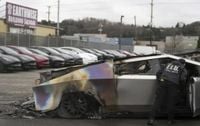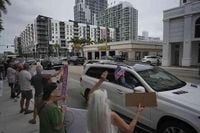In a dramatic escalation of public dissent, crowds protested outside Tesla dealerships across the U.S. and in select European cities on March 29, 2025, targeting billionaire Elon Musk's controversial role in the Trump administration. The protests, dubbed "Tesla Takedown," aimed to amplify a recent decline in the company’s sales and were organized by a coalition of disgruntled Tesla owners, celebrities, and lawmakers.
Protesters gathered at all 277 of Tesla's showrooms and service centers in the U.S., brandishing signs with slogans such as "Honk if you hate Elon" and "Fight the billionaire broligarchy." The protests were largely peaceful, with many participants chanting, "Hey, hey, ho, ho, Elon Musk has got to go!" outside a showroom in Dublin, California, while counterprotesters waved American flags across the street.
As the day unfolded, crowds grew in cities including New Jersey, Massachusetts, Connecticut, New York, Maryland, Minnesota, and Texas. Major cities like Washington, Chicago, Indianapolis, Cincinnati, and Seattle also saw significant turnout. Among the notable attendees was actor John Cusack and Democratic lawmakers like Rep. Jasmine Crockett from Dallas and Rep. Pramila Jaypal, who participated in the Seattle protests.
These demonstrations were sparked by Musk's leadership of the newly created Department of Government Efficiency, where he has gained access to sensitive government data and has been accused of implementing drastic cuts to government agencies. Critics argue that his influence over the administration has detrimental implications for democracy and public welfare.
With an estimated fortune of $340 billion, primarily derived from Tesla stock, Musk has become a polarizing figure. The protests represent a growing backlash against his perceived alignment with right-wing politics and the impact of his policies on the general populace.
Earlier protests had been sporadic, but Saturday marked a coordinated effort to surround Tesla locations nationwide, signaling a more organized and determined opposition. Supporters of the Tesla Takedown movement emphasized the importance of peaceful demonstrations, although tensions flared in some areas. Local police in Watertown, Massachusetts, reported that a black pickup struck two people at a protest, but fortunately, there were no serious injuries.
In a separate incident, police in northwestern Germany were investigating a fire that destroyed seven Tesla vehicles early on the same day. While it remains unclear if the fire was connected to the protests, it adds to the growing narrative of unrest surrounding the brand.
As Tesla continues to face scrutiny, the company's sales have taken a hit, with reports indicating that only 1.8% of surveyed buyers are currently shopping for Teslas, a decrease from 3.3% just a few months prior. This decline in interest reflects broader concerns about the company's future, particularly as competition in the electric vehicle market intensifies.
While Tesla has long been viewed as a leader in the EV space, the landscape is changing rapidly. Other manufacturers are catching up, offering comparable or superior vehicles that are often more affordable. The Kia EV6, for instance, is gaining traction with buyers and is expected to be eligible for the same federal EV tax credit as the Tesla Model Y.
Moreover, Tesla's safety record has come under fire. The National Highway Traffic Safety Administration has opened several investigations into Tesla's Autopilot system, which has been linked to numerous crashes and fatalities. As more consumers become aware of these issues, the brand's reputation may continue to suffer.
In light of these developments, many current Tesla owners are contemplating whether it might be time to sell. The resale value of Teslas has been dropping significantly, with aggressive discounting strategies employed by the company to clear inventory. This has left many owners questioning the long-term viability of their investments.
As the protests unfold, the Tesla Takedown movement underscores a growing sentiment among consumers who feel disillusioned by Musk's political maneuvers and the implications for the company. The ongoing demonstrations could signal a pivotal moment for Tesla as it grapples with declining sales and increasing public scrutiny.
While the protests are aimed at Musk's political influence, they also reflect a broader discontent with the billionaire class and their impact on society. As more people rally around the cause, it remains to be seen how Tesla will respond and what the future holds for the electric vehicle giant.
In conclusion, the events of March 29, 2025, mark a significant moment in the ongoing narrative surrounding Tesla and Elon Musk. With protests escalating and public sentiment shifting, the company faces a critical juncture in its history.






